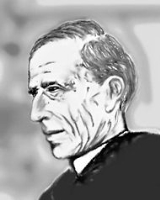
(pjɛʁ tejaʁ də ʃaʁdɛ̃; May 1, 1881 – April 10, 1955) was a French philosopher and Jesuit
priest who trained as a paleontologist
and geologist
and took part in the discovery of both Piltdown Man
and Peking Man
. Teilhard conceived the idea of the Omega Point
and developed Vladimir Vernadsky
's concept of Noosphere
. Some of his ideas came into conflict with the Magisterium
of the Catholic Church, and several of his books were censured.
Teilhard's primary book, The Phenomenon of Man
, set forth a sweeping account of the unfolding of the cosmos
.
We only have to look around us to see how complexity and psychic temperature are still rising: and rising no longer on the scale of the individual but now on that of the planet. This indication is so familiar to us that we cannot but recognize the objective, experiential, reality of a transformation of the planet as a whole.![]()
The reality of spirit-matter is inevitably translated into and confirmed by a structure of the spirit.![]()
The day will come when, after harnessing space, the winds, the tides, gravitation, we shall harness for God the energies of love. And, on that day, for the second time in the history of the world, man will have discovered fire.![]()
By virtue of creation, and still more the incarnation, nothing here is profane for those who know how to see.
:Le Phénomène Humain (1955)
![]()
Love alone is capable of uniting living beings in such a way as to complete and fulfill them, for it alone takes them and joins them by what is deepest in themselves. All we need is to imagine our ability to love developing until it embraces the totality of men and the earth.
![]()
A universal love is not only psychologically possible; it is the only complete and final way in which we are able to love.
![]()
If there were no internal propensity to unite, even at a prodigiously rudimentary level — indeed in the molecule itself — it would be physically impossible for love to appear higher up, with us, in hominized form. . . . Driven by the forces of love, the fragments of the world seek each other so that the world may come into being.
![]()

